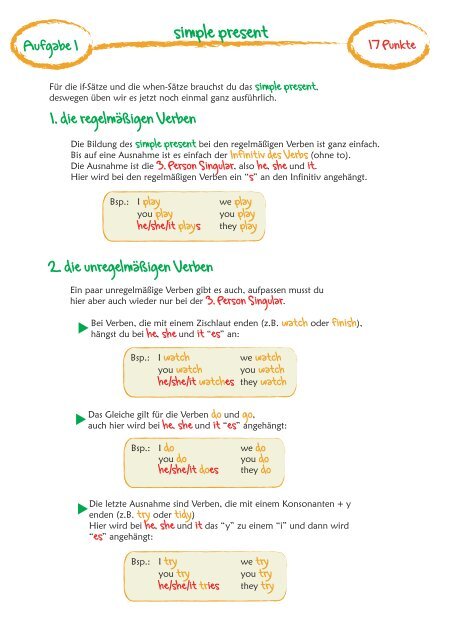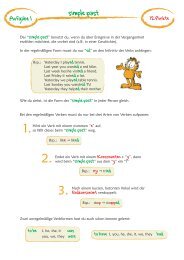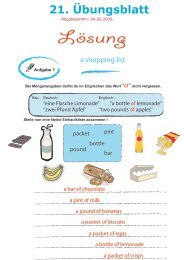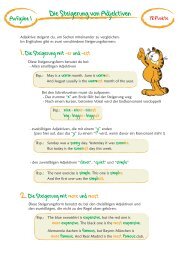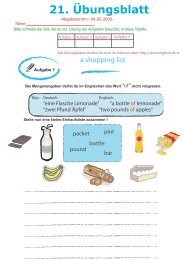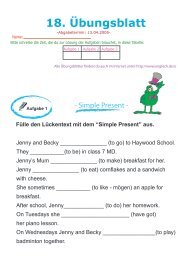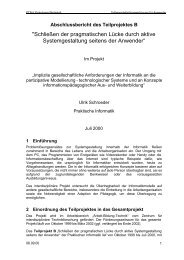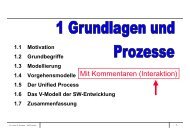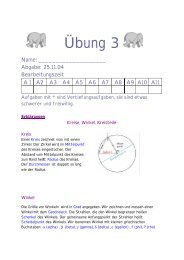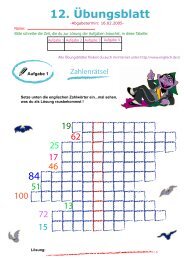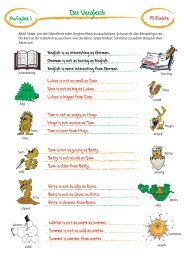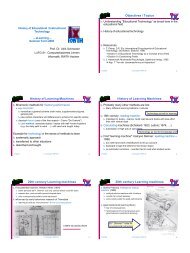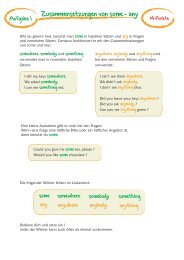You also want an ePaper? Increase the reach of your titles
YUMPU automatically turns print PDFs into web optimized ePapers that Google loves.
Aufgabe 1<br />
<strong>simple</strong> <strong>present</strong><br />
Für die if-Sätze und die when-Sätze brauchst du das <strong>simple</strong> <strong>present</strong>,<br />
deswegen üben wir es jetzt noch einmal ganz ausführlich.<br />
1. die regelmäßigen Verben<br />
Die Bildung des <strong>simple</strong> <strong>present</strong> bei den regelmäßigen Verben ist ganz einfach.<br />
Bis auf eine Ausnahme ist es einfach der Infinitiv des Verbs (ohne to).<br />
Die Ausnahme ist die 3. Person Singular, also he, she und it.<br />
Hier wird bei den regelmäßigen Verben ein “s” an den Infinitiv angehängt.<br />
Bsp.: I play we play<br />
you play you play<br />
he/she/it plays they play<br />
2. die unregelmäßigen Verben<br />
Ein paar unregelmäßige Verben gibt es auch, aufpassen musst du<br />
hier aber auch wieder nur bei der 3. Person Singular.<br />
Bei Verben, die mit einem Zischlaut enden (z.B. watch oder finish),<br />
hängst du bei he, she und it “es” an:<br />
Bsp.: I watch we watch<br />
you watch you watch<br />
he/she/it watches they watch<br />
Das Gleiche gilt für die Verben do und go,<br />
auch<br />
hier wird bei he, she und it “es” angehängt:<br />
Bsp.: I do we do<br />
you do you do<br />
he/she/it does they do<br />
Die letzte Ausnahme sind Verben, die mit einem Konsonanten + y<br />
enden<br />
(z.B. try oder tidy)<br />
Hier wird bei he, she und it das “y” zu einem “i” und dann wird<br />
“es” angehängt:<br />
Bsp.: I try we try<br />
you try you try<br />
he/she/it tries they try<br />
17 Punkte
Deine Aufgabe:<br />
Setze überall die richtige Form des <strong>simple</strong> <strong>present</strong> ein.<br />
Pass bei der 3. Person Singular gut auf !<br />
1. I never _______________ forget (to forget) my homework.<br />
2. My sister _______________ (to like) horses very much.<br />
3. They _______________ (to visit) their Grandma every weekend.<br />
visit<br />
4. He always _______________ washes (to wash) his hands before lunch.<br />
5. My brother always _______________ tries (to try) to catch me<br />
but he never _______________ catches (to catch) me.<br />
6. We _______________ buy (to buy) this magazine every Saturday.<br />
7. His father usually _______________ (to work) late.<br />
spies<br />
likes<br />
8. She _______________ (to spy) with her little eye something green.<br />
9. The friends always _______________ meet (to meet) in the afternoon.<br />
10. His Grandpa always _______________ (to wear) a coat.<br />
need<br />
works<br />
11. We _______________ (to need) our English books every lesson.<br />
12. Her brother never _______________ (to tidy up) his room.<br />
drink<br />
wears<br />
13. I never _______________ (to drink) milk.<br />
goes<br />
tidies up<br />
14. Sarah usually _______________ (to go) to bed at 9 o’clock and<br />
_______________ gets up (to get up) at 8 o’clock in the morning.<br />
15. It often _______________ rains (to rain) in autumn.<br />
16. Carsten _______________ (to collect) our papers every Thursday.<br />
collects
Aufgabe 2<br />
Verneinung im <strong>simple</strong> <strong>present</strong><br />
Ein Vollverb im <strong>simple</strong> <strong>present</strong> verneinst du, indem du don’t oder doesn’t<br />
vor den Infinitiv des Verbs (ohne to) setzt.<br />
Bsp.: I don’t play we don’t play<br />
you don’t play you don’t play<br />
he/she/it doesn’t play they don’t play<br />
doesn’t benutzt du nur in der 3. Person Singular, in allen anderen<br />
Formen heißt es don’t !<br />
Denk auch daran, dass nach doesn’t der Infinitiv steht, du darfst in<br />
der verneinten Form kein “s” mehr an den Infinitiv anhängen, weil<br />
es ja schon im Wort doesn’t drin steckt.<br />
Bilde nun zu jedem Satz den verneinten Satz im <strong>simple</strong> <strong>present</strong> !<br />
1<br />
3<br />
5<br />
7<br />
She likes cheese very much.<br />
2<br />
They come from Nottingham.<br />
My brother watches TV every week.<br />
4<br />
It rains in London every day.<br />
They win every game.<br />
6<br />
Her sister reads a new book every month.<br />
The Burtons go for a walk every Sunday.<br />
8<br />
She doesn’t like cheese very much.<br />
They don’t come from Nottingham.<br />
My brother doesn’t watch TV every week.<br />
It doesn’t rain in London every day.<br />
They don’t win every game.<br />
Her sister doesn’t read a new book every month.<br />
The Burtons don’t go for walk every Sunday.<br />
Her mother sings in the bathroom every morning.<br />
Her mother doesn’t sing in the bathroom every morning.<br />
15 Punkte
9<br />
11<br />
13<br />
15<br />
Aufgabe 3<br />
I understand the exercises.<br />
10<br />
His father gets up at 5 o’clock in the morning.<br />
Our cat sleeps in the afternoon.<br />
12<br />
School starts at 8 o’clock.<br />
He listens to the same song every day.<br />
14<br />
They look at the notice board every morning.<br />
That shop sells the best chocolate.<br />
16<br />
I don’t understand the exercises.<br />
His father doesn’t get up at 5 o’clock in the morning.<br />
Our cat doesn’t sleep in the afternoon.<br />
School doesn’t start at 8 o’clock.<br />
He doesn’t listen to the same song every day.<br />
They don’t look at the notice board every morning.<br />
That shop doesn’t sell the best chocolate.<br />
His family lives in Germany.<br />
His family doesn’t live in Germany.<br />
vocabulary<br />
Streiche das Wort, welches nicht zu den anderen passt, durch !<br />
5 Punkte<br />
father<br />
daughter sun<br />
stage<br />
stall<br />
costume<br />
mother<br />
theatre<br />
sometimes<br />
usually often<br />
to shout<br />
now<br />
nicer<br />
to say to ask<br />
to jump<br />
boringer <strong>simple</strong>r<br />
cleverer
Aufgabe 4<br />
If-Sätze und when-Sätze<br />
Nach so viel <strong>simple</strong> <strong>present</strong> dürften die if-Sätze und when-Sätze ja jetzt<br />
kein Problem mehr sein. Zur Erinnerung:<br />
if-Satz / when-Satz<br />
<strong>simple</strong> <strong>present</strong><br />
If it rains,<br />
When he opens his <strong>present</strong>,<br />
Hauptsatz<br />
will future<br />
we won’t play outside.<br />
he will be very surprised.<br />
Auf geht’s !<br />
Setze in die Lücken die richtige Form des Verbs ein.<br />
Benutze bei den roten Verben bitte wieder die verneinte Form.<br />
20 Punkte<br />
1. If the weather _______________ is (to be) good, we _______________ will go (to go)<br />
for a walk in the park.<br />
2. He _______________ will play (to play) a part if Mrs Dane _______________ asks (to ask) him.<br />
3. When we _______________ arrive (to arrive) at Goose Fair, I _______________ will eat (to eat)<br />
a lot of popcorn.<br />
4. If you _______________ don’t come (to come) to my party, I _______________ will be (to be)<br />
very sad.<br />
5. When she _______________ finishes (to finish) her homework,<br />
she _______________ will meet (to meet) her friends.<br />
6. We _______________ won’t play (to play) a game if you _______________ aren’t (to be) quiet !<br />
7. She _______________ will do (to do) her homework when she<br />
_______________ comes<br />
(to come) home from school.
8. If I _______________ don’t learn (to learn) the words for the play by heart,<br />
I _______________ won’t remember (to remember) them.<br />
9. When she _______________ gets (to get) her pocket money,<br />
she _______________ will buy (to buy) a new CD.<br />
10. If he _______________ kicks (to kick) the football into the sea,<br />
his brother _______________ will be (to be) very angry.<br />
11. When her mother _______________ comes (to come) home,<br />
they _______________ will go (to go) to the shops.<br />
Aufgabe 5<br />
vocabulary<br />
Viele kleine Wörter, die man schnell vergisst. Kennst du sie noch ?<br />
alone alleine<br />
at first<br />
zuerst<br />
straight<br />
already<br />
order<br />
around<br />
towards<br />
as soon as<br />
direkt, gerade(wegs)<br />
schon, bereits<br />
Reihenfolge.<br />
Ordnung<br />
um<br />
auf...zu<br />
sobald<br />
each<br />
at once<br />
early<br />
anyway<br />
gone<br />
at last<br />
all over<br />
at the<br />
bottom of<br />
jede/r/s<br />
sofort<br />
früh<br />
15 Punkte<br />
jedenfalls, sowieso<br />
weg, verschwunden<br />
schließlich, zuletzt<br />
überall (auf)<br />
ganz unten, hinten
Aufgabe 6<br />
1<br />
3<br />
5<br />
1<br />
3<br />
5<br />
Übersetzung<br />
His two younger brothers saw the ghost before him.<br />
2<br />
Teil 2: Deutsch Englisch<br />
Ich glaube, dass meine Stimme zu leise sein wird.<br />
2<br />
Falls wir nach London fahren, werde ich dir eine Postkarte schicken.<br />
Das Haus des alten Mannes ist sehr hübsch.<br />
4<br />
We’ll go through your part at lunch time.<br />
You look great in that old costume !<br />
4<br />
Sarah hopes she will find her sister’s ring.<br />
A pillow hit Robert’s face and his beard came off.<br />
Nächstes Jahr werden wir den Urlaub in England verbringen.<br />
Er fängt gewöhnlich jeden Ball.<br />
Teil 1: Englisch Deutsch<br />
Seine zwei jüngeren Brüder sahen den Geist vor ihm.<br />
Wir werden deine Rolle in der Mittagszeit durchgehen.<br />
Du siehst toll aus in dem alten Kostüm !<br />
Sarah hofft, dass sie den Ring ihrer Schwester finden wird.<br />
EIn Kissen traf Roberts Gesicht und sein Bart fiel herunter.<br />
I think my voice will be too quiet.<br />
If we go to London, I will send you a postcard.<br />
The old man’s house is very pretty.<br />
Next year we’re going to spend the holidays in England.<br />
He usually catches every ball.<br />
20 Punkte


